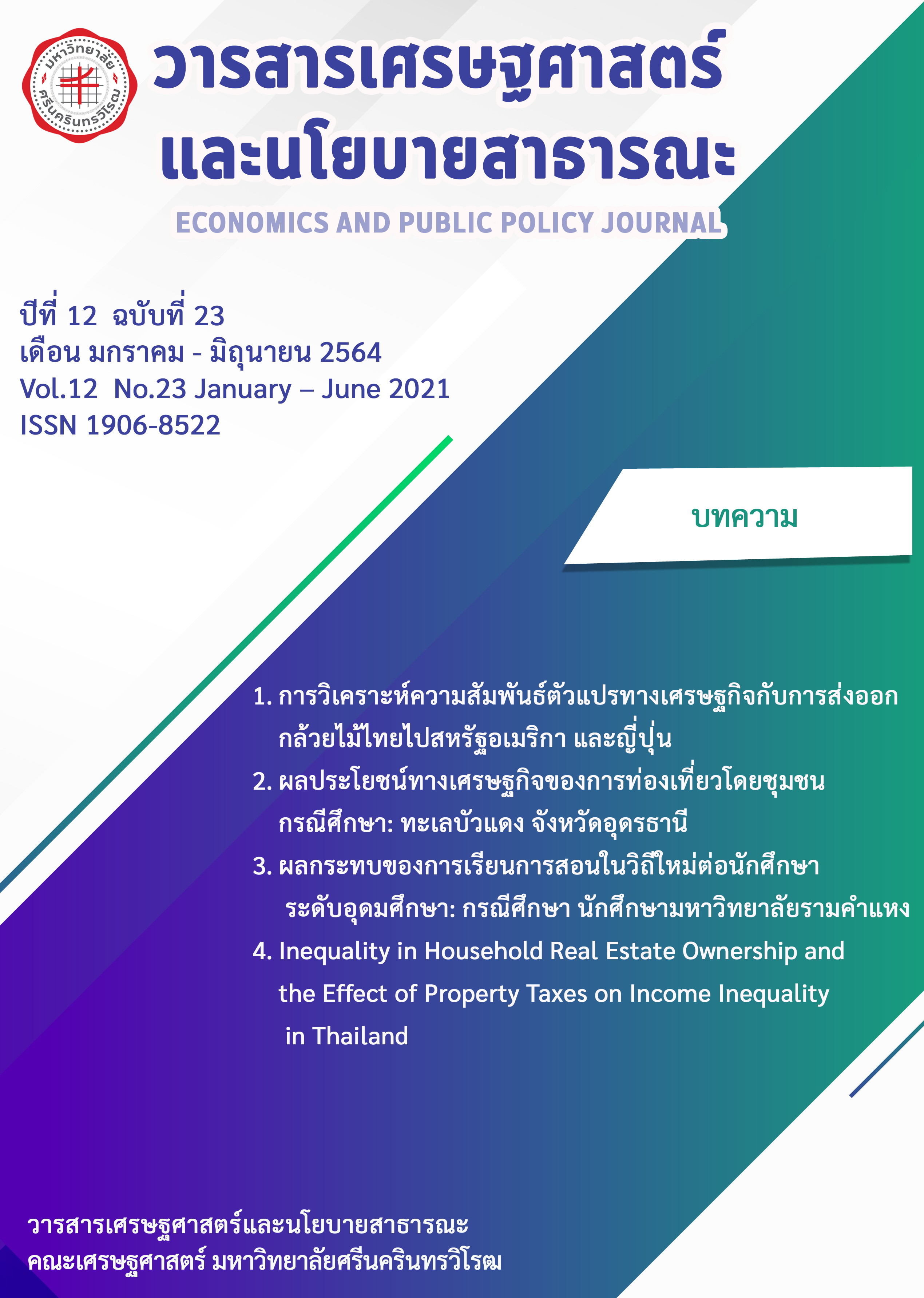Economic Benefits of Community Based Tourism (CBT) Case Study: The Red Lotus Lake, Udonthani
Main Article Content
Abstract
An investigation of the financial cost-benefit analysis of boat services around the Red Lotus Lake shows a positive net present value (NPV), which means the boat service investment is worthwhile. The two most profitable piers are Baan Diem and Chiang Wae, which have more tourists than the rest of the piers. The boat service's payback period in Baan Diem Pier accounts for one year and eight months for a big-size boat, while the payback period for a small-size boat is five months shorter. The estimation of total economic benefits of the boat service around the red Lotus Lake is approximately 11,604,759 Baht per year, allocated through approximately 380 boat drivers. The empirical result shows that the Red Lotus Lake’s boat service has clearly generated an economic benefit for the lake's community. However, the variance in the number of tourists and boats at different piers presents an investment risk that may cause differences in net income. Therefore, the community and the government sector should focus on the management of the Red Lotus lake as community-based ecotourism, with an emphasis on sustainable ecological care to ensure income and ecosystem sustainability go in a complementary direction.
Article Details

This work is licensed under a Creative Commons Attribution-NonCommercial-NoDerivatives 4.0 International License.
สงวนลิขสิทธิ์ © 2553 คณะเศรษฐศาสตร์ มหาวิทยาลัยศรีนครินทรวิโรฒ
คณะเศรษฐศาสตร์ มหาวิทยาลัยศรีนครินทรวิโรฒ จัดพิมพ์วารสารเศรษฐศาสตร์และนโยบายสาธารณะ เพื่อเผยแพร่บทความวิชาการทางเศรษฐศาสตร์ นโยบายสารธารณะ และสาขาอื่นๆที่เกี่ยวข้อง ทัศนะและข้อคิดเห็นใดๆที่ปรากฏในวารสารเป็นความคิดเห็นส่วนตัวของผู้เขียน โดยบทความที่ได้รับการตอบรับจะถือเป็นลิขสิทธิ์ของคณะเศรษฐศาสตร์ มหาวิทยาลัยศรีนครินทรวิโรฒ
บรรณาธิการ ผู้ช่วยศาสตราจารย์ ดร.ณัฐญา ประไพพานิช
References
กาจ วัฒนศรีส่ง. (2545). การศึกษาความเป็นไปได้ทางเศรษฐศาสตร์ของโครงการสถานที่พักแรม
เพื่อตอบสนองต่อการท่องเที่ยวเชิงนิเวศ. รายงานการศึกษาอิสระเศรษฐศาสตรมหาบัณฑิต สาขาเศรษฐศาสตร์ธุรกิจ มหาวิทยาลัยเกษตรศาสตร์.
คณะทำงานอนุรักษ์ฟื้นฟูและพัฒนาทะเลบัวแดงอย่างยั่งยืน. (ม.ป.ป.) แผ่นพับทะเลบัวแดง “ทะเลบัวแดงวันเดียวเที่ยวไม่หมด”.
ฐิติพร วรฤทธิ์. (2561). การวิเคราะห์ต้นทุน ผลตอบแทน และความคุ้มค่าของธุรกิจโฮมสเตย์ตามแนวเศรษฐกิจพอเพียงของชุมชนบ้านโคกเมือง ตำบลจรเข้มาก อำเภอประโคนชัย จังหวัดบุรีรัมย์. การประชุมวิชาการระดับชาติและนานาชาติ “ราชภัฏวิจัย ครั้งที่ 4. บุรีรัมย์: มหาวิทยาลัยราชภัฏบุรีรัมย์.
เยาวเรศ ทับพันธุ์. (2543). การประเมินโครงการตามแนวทางเศรษฐศาสตร์. พิมพ์ครั้งที่ 2.
กรุงเทพฯ: สำนักพิมพ์มหาวิทยาลัยธรรมศาสตร์.
สินธุ์ สโรบล. 2557. การจัดการท่องเที่ยวโดยชุมชน. ค้นเมื่อ 23 กันยายน 2560, จากhttps://www.trf.or.th/index.php?option=com_content&view=article&id=957:2012-07-01-03-23-01&catid=35:research-forum&Itemid=146&option=com_content&view= article&id=957:2012-07-01-03-23-01&catid=35:research-forum&Itemid=146
Asker, S., Boronyak, L., Carrard, N. and Paddon, M. (2010). Effective Community Based Tourism. APEC TOURISM WORKING GROUP. Sydney: Sustainable Tourism Cooperative Research Centre.
Kiss, A. (2004). Is community-based ecotourism a good use of biodiversity conservation funds?. TRENDS in Ecology and Evolution. 19 (5), 232-237.


